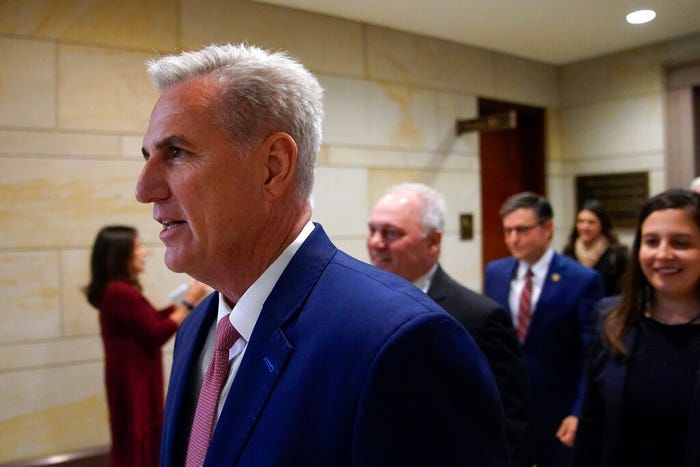
GOP Rep. Adam Kinzinger says House Republicans will have a 'totally nonfunctional majority' in 2023 and McCarthy as speaker will be 'the equivalent of the dog who caught the car'
Republicans this week clinched a majority in the US House of Representatives after claiming their 218th seat in the 435-member body, flipping the lower chamber from the Democratic Party more than a week after the midterm election.
But despite their newfound House majority, the GOP will have a razor-thin edge, with the party currently holding a 219-211 advantage with just a handful of races left to call.
And according to GOP Rep. Adam Kinzinger of Illinois — a prominent member of the House January 6 committee who's retiring at the end of the current Congress — the party will have a "totally nonfunctional majority" once the new session convenes in January 2023.
Kinzinger, who spoke on Charlie Sykes' Bulwark podcast about the internal dynamics within the GOP caucus, including the challenges that Minority Leader Kevin McCarthy of California faces in rounding up the requisite 218 votes to earn the speaker's gavel on the floor House floor, said that Democrats would need to be strategic about the situation if they hoped to block a McCarthy speakership.
"When there's a 15, 20 person majority, it takes a lot of people to deny the future Speaker his votes. But when it's just like three, four, five you can find it – which is why I think the Democrats need to be really thinking about, and thinking about working people like AOC and some of those that are never going to vote for a Republican — find a Republican that is agreeable, try to find a couple of Republicans that are in elected office, and then vote for that person for Speaker," he said.
Kinzinger, who was first elected in 2010 and was formerly close to McCarthy, slammed his onetime friend who is navigating a delicate situation of trying to appease far-right, mainstream conservative, and moderate members of his caucus with a thin majority — a tough prospect for any Republican lawmaker in leadership.
"This couldn't happen to a nicer guy," Kinzinger quipped. "I used to be great friends with Kevin McCarthy. He's been the biggest disappointment of my life."
He then went on to criticize Rep. Elise Stefanik of New York, who replaced Liz Cheney as the chair of the House Republican Conference last year after the Wyoming congresswoman repeatedly spoke out against former President Donald Trump's debunked election claims and his role on January 6, 2021.

"Here's the dynamics in the caucus. Yes, Andy Biggs [of Arizona] is going to run against him, which is meaningless because Kevin will get a majority of the caucus," he continued to say. "Suppose they end up with 220 people. He needs 111. That'll be done. The question then is whether you can get to 218 on the floor, because that's what you'll need."
"That's where you can extract power. Why is Marjorie Taylor Greene super supportive of Kevin? She doesn't like Kevin. He's promised something to her. I guarantee you. Why is Matt Gaetz against Marjorie Taylor Greene? Because probably Kevin McCarthy has yet to promise him anything, and secondarily, he wants to be more famous than Marjorie Taylor Greene," he added.
'Each person now has the power of a senator'
Kinzinger then blasted the ultraconservative Freedom Caucus as the "Freedom Club," and said for many of their members, their ideology has "never been principle-based" but rooted in gaining fame.
The Illinois congressman reiterated that McCarthy — if he becomes speaker — will have his hands full as members in a 220-or-221-member GOP caucus will effectively have veto power over most legislation.
"It's a totally nonfunctional majority because — I've lived this — where [Republicans] want to defund Obamacare. 'Well, we don't defund it enough.' Or if we want to just pass the budget, we have to defund Obamacare because there's 10 Republicans that are willing to vote 'no' on a conservative bill so we don't have enough people to get it done. If you're down to one or two people, each person now has the power of a senator," he said.
"It will be an unfunctional majority, and Kevin will probably be the equivalent of the dog who caught the car," he added.
Kinzinger said that past GOP speakers had remarkable legislative skills, but still struggled to round up votes on several key issues even with larger caucus sizes.
"[John] Boehner was one of the best at cutting deals. He struggled. Paul Ryan knew policy. He was a moderate, good guy. He struggled," the congressman said. "Kevin McCarthy is going to have trouble."
Comments












